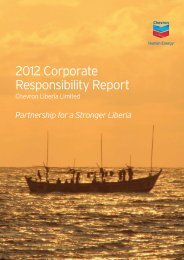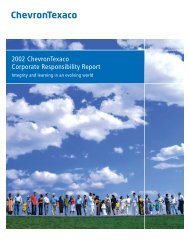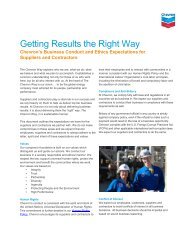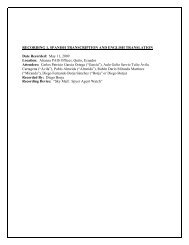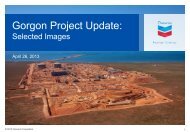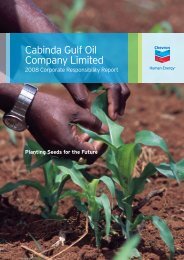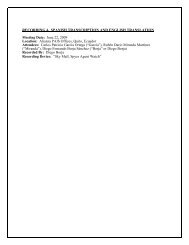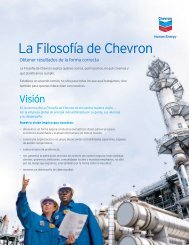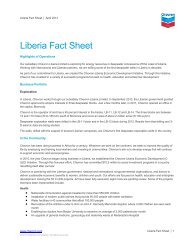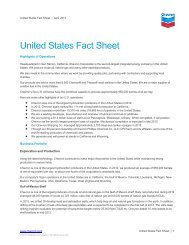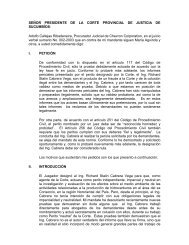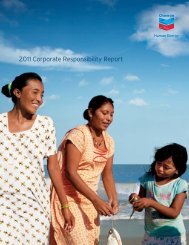Unocal 2000 Annual Report - Chevron
Unocal 2000 Annual Report - Chevron
Unocal 2000 Annual Report - Chevron
- No tags were found...
You also want an ePaper? Increase the reach of your titles
YUMPU automatically turns print PDFs into web optimized ePapers that Google loves.
<strong>Unocal</strong> Corporation <strong>Annual</strong> <strong>Report</strong> <strong>2000</strong>
HighlightsYears ended December 31<strong>2000</strong> 1999 1998Financial (millions of dollars except per share amounts)Total revenues from continuing operations $ 9,202 $ 5,961 $ 5,007Earnings from continuing operations $ 723 $ 113 $ 93Earnings from discontinued operations (net of tax) $ 37 $ 24 $ 37Net earnings $ 760 $ 137 $ 130Basic earnings per share of common stock:Continuing operations $ 2.98 $ 0.47 $ 0.39Discontinued operations $ 0. 1 5 $ 0.10 $ 0. 15Net earnings per share of common stock $ 3. 1 3 $ 0. 57 $ 0.54Diluted earnings per share of common stock:Continuing operations $ 2.93 $ 0.46 $ 0.39Discontinued operations $ 0. 1 5 $ 0.10 $ 0. 1 5Net earnings per share of common stock $ 3.08 $ 0.56 $ 0.54Adjusted earnings from continuing operations (a) $ 798 $ 149 $ 129Adjusted basic earnings per share from continuing operations (a) $ 3.22 $ 0. 6 1 $ 0.54Return on average stockholders’ equity:Continuing operations 29.5% 5.2% 4.1 %Including discontinued operations 31.0% 6.2% 5.8%Cash dividends declared per common share $ 0.80 $ 0.80 $ 0.80Capital expenditures from continuing operations (b) $ 1,288 $ 1,1 61 $ 1,696Total assets $ 10,010 $ 8,967 $ 7,952Total debt and capital leases $ 2,506 $ 2,854 $ 2,558Trust convertible preferred securities $ 522 $ 522 $ 522Stockholders’ equity $ 2,7 19 $ 2,184 $ 2,202Per common share $ 11.19 $ 9.01 $ 9. 1 3OperationsNet proved reservesCrude oil and condensate (million barrels) (c) 632 550 532Natural gas (billion cubic feet) (c) 6,540 6,618 6,122Geothermal (billion kilowatt-hours) (d) 114 120 157Net daily productionCrude oil and condensate (thousand barrels) (c) 175 175 184Natural gas (million cubic feet) (c) 2,007 1,836 1,826Natural gas liquids (thousand barrels) 15 19 19Geothermal (million kilowatt-hours) 16 17 21(a) Special items are detailed in Management’s Discussion and Analysis of Financial Condition and Results of Operations in <strong>Unocal</strong>’s <strong>2000</strong> Form 10-K.(b) Excludes major acquisitions.(c) Includes certain host countries’ shares, the company’s proportional shares of equity investees and 100% of consolidated subsidiaries. See the SupplementalInformation on Oil and Gas Exploration and Production Activities and the Operating Summary in <strong>Unocal</strong>’s <strong>2000</strong> Form 10-K for further information.(d) Includes reserves underlying a service fee arrangement in the Philippines.2<strong>Unocal</strong> Corporation
1º n116º eL O N G I T U D ETh e U.S. consumes about 25% of the world’s natural gas and crude oil.119º eL A T I T U D E2º sE. Kalimantan PSCSesulu PSCDeepwater PSC'sEAST KALIMANTANIn 1970, <strong>Unocal</strong> discoveredAttaka, Indonesia’s largestoffshore field. In March2001, the field producedWe focused much of our activity during the year on boostingproduction of natural gas from our U.S. Lower 48 operations,allowing us to increase sales into the current high-demand,high-price North American gas market.With our strong base of sustaining operations leading the way,<strong>Unocal</strong> generated $2 billion in operating cash flows last year. Thesesustaining assets provide the production and earnings to keep thecompany strong and to fund future growth. They also give usongoing opportunities to improve operating efficiency, developour employees, and expand enduring business relationships.<strong>Unocal</strong> has the skill and experience to continue realizing significantpotential from these high-quality assets. For example, we passeda 600-million-barrel cumulative gross production milestone in ourTrading Bay Unit (the McArthur River field) in southern Alaska’sCook Inlet in January of this year. The unit has been producingsince 1967. We recently passed the same milestone in the Attakafield offshore East Kalimantan. Attaka, our first discovery inIndonesia, has been producing since 1972. <strong>Unocal</strong>’s workinginterest in both of these fields is 50 percent.<strong>Unocal</strong> Indonesia9 producing oil and gas fieldsInterests in 11 production-sharingcontractareas covering more than10 million acres<strong>Unocal</strong>’s production on theEast Kalimantan shelf averaged120,000 barrels of oil equivalent(gross) per day in <strong>2000</strong>,up 7 percent from 1999. <strong>Unocal</strong>holds a 50 percent workinginterest in the largest of theproducing fields, Attaka, and100 percent working interest ineight other fields. <strong>Unocal</strong> hasalso begun development ofIndonesia’s first deepwaterfield, West Seno, discovered in1998, with the start of productionscheduled for late 2002.its 600 millionth barrelof crude oil.In <strong>2000</strong>, <strong>Unocal</strong> replaced 136 percent of net worldwide crude oiland natural gas production with new proved reserves. At year-endour worldwide oil and gas reserves totaled 1.72 billion barrels of oilequivalent, up 4 percent from the year before. About two-thirds ofthis total is natural gas.<strong>Unocal</strong> has significant discovery volumes in the deepwater areasof the Gulf of Mexico and offshore Indonesia, and in Bangladesh,Vietnam, Azerbaijan and Thailand that await either marketdevelopment or official project sanction before they can beadded to our proved reserves. In Asia alone, we have announcedgas discoveries totaling more than 13 trillion cubic feet (TCF) ofgross resource potential that could help meet future regionalpower needs. This includes 3 to 6 TCF in Bangladesh, 4 to 6 TCFin Indonesia, 4 to 5 TCF in Thailand, and 2 to 3 TCF in Vietnam.<strong>Unocal</strong>’s average working interest is about 60 percent.Deepwater ExplorationSince <strong>Unocal</strong> first ventured into deeper offshore waters four yearsago, we have rapidly positioned ourselves in four key basinsaround the world. We have so far participated in four deepwaterdiscoveries in the Gulf of Mexico and, as operator, in multipledeepwater discoveries offshore East Kalimantan in Indonesia.We expect to drill or participate in 18 to 20 wells in water depthsranging from 5,000 to 10,000 feet this year. These will includeour first deepwater wells offshore Brazil and Gabon.We have reported results from the first three deepwater wells inour current program — one hit in Indonesia and two misses in the4<strong>Unocal</strong> Corporation
John W. Creighton, Jr.Chairman of the BoardGulf of Mexico, but it remains much too early to accurately measurethe ultimate success of this year’s drilling program. Exploration is ahigh-risk business that generally produces more dry holes thandiscoveries. Given the quality of our deepwater portfolio and theestimated resource potential in individual prospects, two or threediscoveries could make a significant difference in <strong>Unocal</strong>’s resourcebase and future growth.We made our first deepwater discovery of 2001 offshore EastKalimantan in Indonesia. The Ranggas-1 well, drilled on the crest ofa large underground structure, encountered 250 feet of gas payand 40 feet of oil pay. Appraisal wells will give us more informationabout the discovery’s commerciality. <strong>Unocal</strong>’s working interestis 80 percent.Ranggas-1 was drilled in only 16 days and at low cost to a depth ofnearly 12,000 feet in more than 5,000 feet of water. This high levelof drilling skill was acknowledged by our peers last year, when<strong>Unocal</strong> was asked to drill deepwater wells in Asia for three otheroperators. Although these wells were not commercial, they keptour rig active and helped minimize costs while we completedstudies to prepare for renewed drilling focused on our bestremaining oil prospects. We plan to drill a total of 8 to 10 deepwaterwells this year in Indonesia.The West Seno oil and gas field, discovered in 1998, lies about 30miles northwest of Ranggas-1. The field will be Indonesia’s firstdeepwater development. Our plans are geared toward startup inlate 2002, and we expect production to reach 60,000 barrels of oilper day and 150 million cubic feet of natural gas per day by 2004.<strong>Unocal</strong>’s working interest is 90 percent. Gas from West Seno willbe processed at nearby Bontang, the world's largest LNG (liquefiednatural gas) facility, for export to world markets.In the Gulf of Mexico, the deepwater drillship Discoverer Spirit isscheduled to drill a total of six wells this year, with targets selectedto sample independent prospects in different trends.In the Atlantic Ocean, we are looking to build a long-term businessin Brazil. We have interests in multiple deepwater prospects there,where four wells are planned for later this year. We also expect toparticipate in at least two wells in the deepwater Congo Fan Basinoffshore Gabon this year.Strong Sustaining Businesses<strong>Unocal</strong> has a strong base of producing assets worldwide. Our flagshipoperations in the Gulf of Mexico and Southeast Asia generateabout 75 percent of our worldwide oil and gas production.global presence, good relationships and a reputation as an efficientand reliable operator in international energy projects, <strong>Unocal</strong> isunique among U.S. independents.Our history in the Gulf of Mexico region dates back more than75 years to The Pure Oil Company’s early holdings in Texas (Puremerged with Union Oil Company of California in 1965). In 1937,Pure was a partner in the first offshore, open-water well. UnionOil made its first discovery in the region in Louisiana in 1939 andmoved offshore in 1948.Today, <strong>Unocal</strong> produces more than 1.5 billion cubic feet (gross) ofnatural gas equivalent per day from our operations on the Gulf ofMexico shelf. Natural gas accounts for about 85 percent of thetotal. <strong>Unocal</strong>’s average working interest is 45 percent. Low drillingand lifting costs combined with an extensive existing infrastructureallow us to bring new production on stream rapidly and atlow cost to help meet current high demand for natural gas.We have had an 80 percent success rate in shelf exploration overthe past two years. <strong>Unocal</strong> made one of the shelf’s largest naturalgas discoveries in recent years in 1999 on Ship Shoal Block 295offshore Louisiana. We brought the Muni field on production veryrapidly — in just 10 months — and it was a major factor in the18 percent increase in natural gas production from our U.S. Lower48 operations reported for the fourth quarter of <strong>2000</strong> comparedwith the same period in 1999. Muni reached a production peakof 120 million cubic feet of gas per day in <strong>2000</strong> and is on track toexceed that in 2001. <strong>Unocal</strong>’s working interest is 100 percent.In other areas of North America, we have restructured <strong>Unocal</strong>’sassets to give us interests in companies that have strong regionalfocus on aggressive growth and an emphasis on natural gas. Wehave a 15 percent stake in Tom Brown, Inc., a Rocky Mountainoperator; a 34 percent stake in Matador Petroleum Corporation,with operations in Texas, Oklahoma and New Mexico; and a 65percent interest in Pure Resources, Inc., which was formed to holdthe combined assets of Titan Exploration, Inc. and <strong>Unocal</strong>’s formerPermian and San Juan basin assets in West Texas and New Mexico.We also now own 100 percent of Northrock Resources Ltd., withoperations in west-central Canada.We are sharpening our focus on our Alaska oil and gas operations,which contributed about 9 percent of the Company’s worldwideproduction last year. We plan to sustain and accelerate productionin our Cook Inlet operations in southern Alaska to increase oiloutput and to provide gas supplies to the Agrium fertilizer plantin Kenai and to the city of Anchorage. We also hold small workinginterests in two North Slope fields.Indonesia is the world’s largest liquified natural gas (lng) exporter.We first entered Indonesia and Thailand in the 1960s. Our historyand performance in these areas continue to prove advantageousin smoothing our entry into other international arenas. With aIn the Far East, <strong>Unocal</strong>’s net natural gas production rose nearly 11percent last year. Operations in Indonesia, Thailand, and Myanmaraccounted for nearly half of <strong>Unocal</strong>’s worldwide production.<strong>Unocal</strong> Corporation 5
Terry G. DallasExecutive Vice Presidentand Chief Financial OfficerTimothy H. LingPresident and Chief Operating OfficerBrazil, the world’s 9th largest economy, has rapidly growing oil, natural gas and electricity markets.<strong>Unocal</strong> Indonesia Company had a very successful exploration programon the shelf offshore East Kalimantan. Six small discoveriesand extensions enabled the business unit to rapidly place newproduction on stream in <strong>2000</strong>.One of the most productive of these new projects is the Mahonifield. At first considered marginal, the field merited a second lookas Indonesia worked to meet higher production quotas set byOPEC (the Organization of Petroleum Exporting Countries).Together, <strong>Unocal</strong> and Pertamina, the state oil company, were ableto develop an economic framework that would make productionfrom the field financially viable. Mahoni, on stream since lastOctober, currently flows at more than 5,700 barrels of oil per day.<strong>Unocal</strong>’s working interest is 100 percent.<strong>Unocal</strong> Thailand, Ltd., was able to maintain gross production atover 1 billion cubic feet of gas per day in <strong>2000</strong> (net to <strong>Unocal</strong>, 619million cubic feet per day), well above the minimum levels calledfor in our gas sales contracts. The company began productionfrom the Erawan field in 1981 and today operates 13 fields in theGulf of Thailand. In May <strong>2000</strong>, we produced the 4 trillionth cubicfoot of natural gas from these operations.As Thailand’s largest energy supplier, <strong>Unocal</strong>’s gas productionsupported about one-third of the country’s power generationneeds in <strong>2000</strong>. Power demand, a close indicator of economicstrength, strongly rebounded in <strong>2000</strong> from the levels followingthe 1997 Asian downturn — a proof of recovery. <strong>Unocal</strong> holdsinterests in two commercial electric power plant projects, andin a third set to start up later this year.We view Thailand as the hub of a growing regional market,with new gas supplies coming into Thai power plants from neighboringMyanmar. The Yadana gas project, in which <strong>Unocal</strong> holdsa 28 percent non-operating working interest, is now producing atits contract level of 525 million cubic feet of gas per day. This willdisplace some volumes of gas produced by <strong>Unocal</strong> operations inthe Gulf of Thailand.<strong>Unocal</strong>’s strategy in Thailand is to develop gas resources “justin time” to meet market demands while keeping our capitalspending at prudent levels. This is accomplished through highsuccess rates of exploration drilling — 84 percent in <strong>2000</strong> —and our ability to drill new wells quickly and efficiently to bringreserves on production. In <strong>2000</strong>, <strong>Unocal</strong> Thailand set a new worlddrilling record of 450 feet per hour. This beat the business unit’sprevious world record of 416 feet per hour, set in 1999.While natural gas in Thailand is sold under contract, indigenous oilis scarce and in demand in today’s market. <strong>Unocal</strong> discovered itsfirst crude oil in the Gulf of Thailand in 1999 at the Yala field. Thecompany expects to begin production from three oil fields laterthis year. Production, expected to reach 15,000 barrels per dayduring 2002, will increase the country’s oil production by about 25percent. <strong>Unocal</strong> holds a 71 percent working interest in the fields.RFG UpdateThe U.S. Supreme Court recently decided not to review a lowercourt decision supporting the validity of <strong>Unocal</strong>’s U.S. Patent5,288,393 for reformulated gasoline. The patent was challengedby six major refiners in 1995. We were awarded $91 million indamages, interest and attorneys’ fees last year to cover ’393 patentinfringements in California over a five-month period in 1996. Weare now moving forward with the collection of additional damagesfrom these infringing companies. Our intent is to make allfive of our patents for clean-fuel formulations widely available atfair licensing fees that should have little impact on the averageper-gallon cost of reformulated gasoline.Putting Our Values Into ActionWe are proud of the impact we made in <strong>2000</strong> to advance <strong>Unocal</strong>’svision “to improve the lives of people wherever we work.”Fundamental to this vision is the management of risk — to humanlife, the environment, our operations, and our business. At <strong>Unocal</strong>,we are addressing this critical issue as part of how we operate dayto day through the Operations Management System (OMS), nowimplemented in all our business units. In Thailand, for example,OMS is effectively integrating risk management into businessplans and into every employee’s daily decision-making to make<strong>Unocal</strong> an even more responsible and efficient operator.We also recognize our responsibility to reach out to the largercommunity. In virtually all regions where we operate, <strong>Unocal</strong>supported education, community development and health-careinitiatives in <strong>2000</strong>, building partnerships with local governments,and regional or international NGOs (non-governmental organizations).Examples of these efforts include:• A 4-year public health program in East Kalimantan, Indonesia;• Sustainable development and community education projects inthe Songkhla Province of Thailand;• Tuberculosis and cholera control programs at the InternationalCentre for Diarrhoeal Disease Research in Bangladesh;• Development of family medicine through physician training inSouthwest Vietnam;• In-kind, volunteer and financial support for a new residential shelterfor abused women and their children near Houston.6<strong>Unocal</strong> Corporation
Thailand’s GDP growth is projected at 4.2% in <strong>2000</strong> and above 5% annually by 2002.92º eL O N G I T U D E 108º e18º nMYANMAROn California’s Central Coast, we have successfully completed amajor clean-up and restoration project in the town of Avila Beach,contaminated over several decades by former <strong>Unocal</strong> oil operations.We worked closely with local and state authorities to ensure wemet the community’s goals for the project. Remediation work onthe nearby Guadalupe oil field site continues to make good progress.Andaman SeaLease AreasMyanmarThailandVietnamPower PlantsPipelinesTHAILANDBangkokVIETNAML A T I T U D E<strong>Unocal</strong> also participates actively in the global dialogue on corporateresponsibility through our involvement with the GlobalSullivan Principles, the World Business Council for SustainableDevelopment, the U.S. Chamber of Commerce, Business for SocialResponsibility, Transparency International, and the InternationalPetroleum Industry Environmental Conservation Association.<strong>Unocal</strong>, Thailand’s largestenergy supplier, produced6º nThe Leadership TeamI feel privileged and fortunate to have become <strong>Unocal</strong>’s chief executiveofficer at this pivotal time in our company’s 110-year history.In January of this year, I succeeded Roger C. Beach, who retired inDecember after a nearly 40-year career, the last six years as CEO.Under his leadership, <strong>Unocal</strong> was transformed from a mid-sizedintegrated company with extensive refining and marketing operationsinto one of the world’s largest independent exploration andproduction companies.John W. Creighton, Jr., a <strong>Unocal</strong> director since 1995 and formerpresident and CEO of Weyerhaeuser Company, has been electedChairman of the Board succeeding Roger Beach in that post.Serving with me on <strong>Unocal</strong>’s Management Committee areTimothy H. Ling, who was elected President and Chief OperatingOfficer in January, and Terry G. Dallas, Executive Vice President andChief Financial Officer, who joined <strong>Unocal</strong> in June <strong>2000</strong> after a 21-year career with Atlantic Richfield.natural gas that supportedabout one-third of thecountry’s power generationneeds in <strong>2000</strong>.<strong>Unocal</strong> Thailand13 producing gas fields84% exploration success ratein <strong>2000</strong>First offshore oil production in 2001The members of the Management Committee are committed toproviding a collaborative model of leadership for the organization.Our goal is to ensure that we routinely bring the best minds andthe best ideas to bear on every project. That makes for betterdecisions. It also keeps us agile and able to take advantageof opportunities that fit our strategy in today’s fast-moving,competitive business climate.We are very optimistic about the year before us. We believe it willbe an exciting one for <strong>Unocal</strong>.Sincerely,Charles R. WilliamsonMarch 16, 2001Thailand is the hub of agrowing regional market,with new gas supplies cominginto the Thai power grid fromthe Yadana gas field offshoreMyanmar. <strong>Unocal</strong> holds a28 percent non-operatingworking interest inYadana,which is now producing525 million cubic feet of gasper day. As power marketsdevelop in the region, futuregas supplies can be producedfrom new fields <strong>Unocal</strong> hasdiscovered offshore Vietnamand in the adjacent Arthitblocks in Thai waters.<strong>Unocal</strong> Corporation 7
Corporate GovernanceBoard of Directors<strong>Unocal</strong>’s system of corporate governance emphasizes theBoard of Directors’ effectiveness, independence and abilityto evaluate corporate and management performance.It includes the following:1. Seven of nine directors are independent.2. The Board Governance Committee, composed of nonemployeedirectors only, is charged with the responsibilityof advising the Board on all board governance matters,including: recommending the composition, role, structureand procedures of the board; recommending the appointment,composition and responsibilities of the committeesof the board; and identifying and presenting qualifiedcandidates for election and re-election as directors.3. The Accounting and Auditing Committee, the CorporateResponsibility Committee, and the ManagementDevelopment and Compensation Committee also consistentirely of non-employee directors.4. The Management Development and CompensationCommittee annually evaluates the performance of theCEO and senior management.5. The board reviews succession planning and managementdevelopment at least annually.6. Incentive compensation for executive officers is linked toshare price performance.7. The schedule and length of board meetings allow sufficienttime for in-depth discussions, analysis and strategic planning.8. Non-employee directors meet privately at least once a year.John W. Creighton, Jr., Chairman since January 2001,Director since 1995Former President and Chief Executive Officer,Weyerhaeuser Company (forest products)John W. Amerman, Director since 1991Former Chairman and Chief Executive Officer,Mattel, Inc. (children’s toys)James W. Crownover, Director since 1998Former Director, McKinsey & Company, Inc.(management consulting)Frank C. Herringer, Director since 1989Former Chairman of the Board of Directors,President and Chief Executive Officer,Transamerica Corporation (financial services)Timothy H. Ling, Director since <strong>2000</strong>President and Chief Operating Officer,<strong>Unocal</strong> CorporationDonald B. Rice, Director since 1998President, Chief Executive Officer and Co-Founder,UroGenesys, Inc. (biotechnology)Kevin W. Sharer, Director since 1997Chairman, President and Chief Executive Officer,Amgen Inc. (biotechnology)Marina v. N. Whitman, Director since 1993Professor of Business Administration and Public Policy,University of MichiganCharles R. Williamson, Director since <strong>2000</strong>Chief Executive Officer, <strong>Unocal</strong> Corporation9. The board meeting format is designed to allow interactionbetween Directors and the company’s management.10. The company ensures the confidentiality ofstockholder votes.11. The board sets the corporate governance principles andreviews them at least annually.Executive OfficersCharles R. Williamson, Chief Executive OfficerTimothy H. Ling, President and Chief Operating OfficerTerry G. Dallas, Executive Vice President and Chief Financial OfficerDennis P. R. Codon, Senior Vice President,Chief Legal Officer and General CounselJoe D. Cecil, Vice President and ComptrollerDouglas M. Miller, Vice President, Corporate Development8<strong>Unocal</strong> Corporation
<strong>Unocal</strong> Corporation 2141 Rosecrans Avenue • Suite 4000 • El Segundo, California 90245



